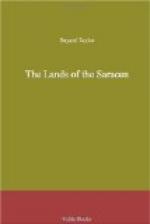While we were eating, the Khowagee, or schoolmaster of the community, a genteel little man in a round white turban, came op to inquire of Francois who we were. “That effendi in the blue dress,” said he, “is the Bey, is he not?” “Yes,” said F. “And the other, with the striped shirt and white turban, is a writer?” [Here he was not far wrong.] “But how is it that the effendis do not speak Turkish?” he persisted. “Because,” said Francois, “their fathers were exiled by Sultan Mahmoud when they were small children. They have grown up in Aleppo like Arabs, and have not yet learned Turkish; but God grant that the Sultan may not turn his face away from them, and that they may regain the rank their fathers once had in Stamboul.” “God grant it!” replied the Khowagee, greatly interested in the story. By this time we had eaten our full share of the kaimak, which was finished by Francois and the katurgees. The old man now came up, mounted on a dun mare, stating that he was bound for Kiutahya, and was delighted with the prospect of travelling in such good company, I gave one of his young children some money, as the kaimak was tendered out of pure hospitality, and so we rode off.
Our new companion was armed to the teeth, having a long gun with a heavy wooden stock and nondescript lock, and a sword of excellent metal. It was, in fact, a weapon of the old Greek empire, and the cross was still enamelled in gold at the root of the blade, in spite of all his efforts to scratch it out. He was something of a fakeer, having made a pilgrimage to Mecca and Jerusalem. He was very inquisitive, plying Francois with questions about the government. The latter answered that we were not connected with the government, but the old fellow shrewdly hinted that he knew better—we were persons of rank, travelling incognito. He was very attentive to us, offering us water at every fountain, although he believed us to be good Mussulmans. We found him of some service as a guide, shortening our road by taking by-paths through the woods.
For several hours we traversed a beautifully wooded region of hills. Graceful clumps of pine shaded the grassy knolls, where the sheep and silky-haired goats were basking at rest, and the air was filled with a warm, summer smell, blown from the banks of golden broom. Now and then, from the thickets of laurel and arbutus, a shrill shepherd’s reed piped some joyous woodland melody. Was it a Faun, astray among the hills? Green dells, open to the sunshine, and beautiful as dreams of Arcady, divided the groves of pine. The sky overhead was pure and cloudless, clasping the landscape with its belt of peace and silence. Oh, that delightful region, haunted by all the bright spirits of the immortal Grecian Song! Chased away from the rest of the earth, here they have found a home—here secret altars remain to them from the times that are departed!




